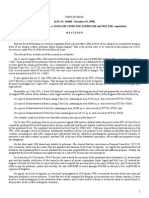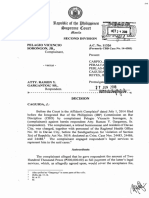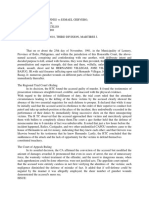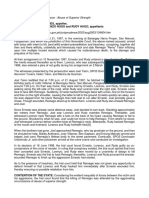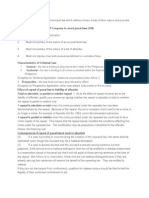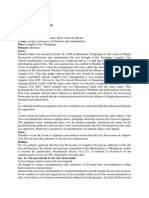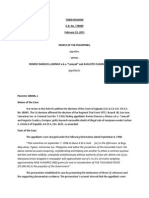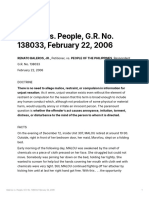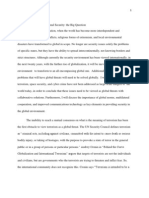Maquilan vs. Maquilan
Maquilan vs. Maquilan
Uploaded by
Ethan KurbyCopyright:
Available Formats
Maquilan vs. Maquilan
Maquilan vs. Maquilan
Uploaded by
Ethan KurbyOriginal Title
Copyright
Available Formats
Share this document
Did you find this document useful?
Is this content inappropriate?
Copyright:
Available Formats
Maquilan vs. Maquilan
Maquilan vs. Maquilan
Uploaded by
Ethan KurbyCopyright:
Available Formats
GR NO. 155409, June 8,2007.
MAQUILAN vs. MAQUILAN
FACTS:
Herein petitioner and herein private respondent are spouses who once had a blissful married life and
out of which were blessed to have a son. However, their once sugar coated romance turned bitter when
petitioner discovered that private respondent was having illicit sexual affair with her paramour, which
thus, prompted the petitioner to file a case of adultery against private respondent and the latter's
paramour. Consequently, both accused were convicted of the crime charged.
Thereafter, private respondent, through counsel, filed a Petition for Declaration of Nullity of Marriage,
Dissolution and Liquidation of Conjugal Partnership of Gains and Damages imputing psychological
incapacity on the part of the petitioner. During the pre-trial of the said case, petitioner and private
respondent entered into a COMPROMISE AGREEMENT.
Subsequently, petitioner filed a motion for the repudiation of the AGREEMENT. This motion was
denied. Petitioner then filed a Petition for Certiorari and Prohibition with the Court of Appeals on the
ground that the convictions of the respondent of the crime of adultery disqualify her from sharing in
the conjugal property. The Petition was dismissed.
ISSUE:
Is the conviction of the respondent of the crime of adultery a disqualification for her to share in the
conjugal property?
RULING:
No. The conviction of adultery does not carry the accessory of civil interdiction. Article 34 of the Revised
Penal Code provides for the consequences of civil interdiction:
Art. 34. Civil Interdiction. — Civil interdiction shall deprive the offender during the time of his sentence
of the rights of parental authority, or guardianship, either as to the person or property of any ward, of
marital authority, of the right to manage his property and of the right to dispose of such property by
any act or any conveyance inter vivos.
Under Article 333 of the same Code, the penalty for adultery is prision correccional in its medium and
maximum periods. Article 333 should be read with Article 43 of the same Code. The latter provides:
Art. 43. Prision correccional — its accessory penalties. — The penalty of prision correccional shall carry
with it that of suspension from public office, from the right to follow a profession or calling, and that of
perpetual special disqualification from the right of suffrage, if the duration of said imprisonment shall
exceed eighteen months. The offender shall suffer the disqualification provided in this article although
pardoned as to the principal penalty, unless the same shall have been expressly remitted in the pardon.
It is clear, therefore, and as correctly held by the CA that the crime of adultery does not carry the
accessory penalty of civil interdiction which deprives the person of the rights to manage her property
and to dispose of such property inter vivos.
CASUPANG SHERWIN LAMPUYAS 1-E CRIMINAL LAW 1
You might also like
- Wedding IndictmentDocument53 pagesWedding IndictmentChris GothnerNo ratings yet
- People v. Kottinger - Art 201Document3 pagesPeople v. Kottinger - Art 201Ethan KurbyNo ratings yet
- Torts Casis Reviewer C2017Document64 pagesTorts Casis Reviewer C2017Ricardo SanchezNo ratings yet
- Readiness of Criminology Graduates 2Document47 pagesReadiness of Criminology Graduates 2Jean Noveros Benedicto82% (11)
- TSA MD 1100.75-3 - Addressing Unacceptable Performance and Conduct - Handbook - 2.6.09Document24 pagesTSA MD 1100.75-3 - Addressing Unacceptable Performance and Conduct - Handbook - 2.6.09Pro TectorNo ratings yet
- ObliCon Cases 1106-1155Document33 pagesObliCon Cases 1106-1155ErwinFunaNo ratings yet
- Republic of The Philippines Vs Hon Caguioa G.R. 174385Document7 pagesRepublic of The Philippines Vs Hon Caguioa G.R. 174385Dino Bernard LapitanNo ratings yet
- Planters Development Bank v. Julie ChandumalDocument5 pagesPlanters Development Bank v. Julie ChandumalEKANGNo ratings yet
- Prebar Notes On Crim Pro09Document95 pagesPrebar Notes On Crim Pro09hanikolayNo ratings yet
- Veneracio CaseDocument1 pageVeneracio Caseann laguardiaNo ratings yet
- Petitioner Vs Vs Respondents Francisco M. Gutierrez The Solicitor GeneralDocument6 pagesPetitioner Vs Vs Respondents Francisco M. Gutierrez The Solicitor GeneralRaymundNo ratings yet
- Sun Insurance Office vs. AsuncionDocument5 pagesSun Insurance Office vs. AsuncionAnakataNo ratings yet
- Civil Procedure CasesDocument4 pagesCivil Procedure CasesSuzy NaeNo ratings yet
- Mitigating CircumstancesDocument27 pagesMitigating CircumstancesCleofe SobiacoNo ratings yet
- RPC Arts. 16-18Document8 pagesRPC Arts. 16-18Marielle GarboNo ratings yet
- Siguan vs. LimDocument6 pagesSiguan vs. LimKJNo ratings yet
- Sorongon vs. GigantosDocument6 pagesSorongon vs. GigantosVal Justin DeatrasNo ratings yet
- Gerbero DamagesDocument5 pagesGerbero DamagescarmineNo ratings yet
- Romeo Igdalino and Rosita IgdalinoDocument10 pagesRomeo Igdalino and Rosita IgdalinoBig BoysNo ratings yet
- 02 Brinas vs. PeopleDocument11 pages02 Brinas vs. PeopleKris Dela CruzNo ratings yet
- Art 2 Consti Digests ScriptDocument24 pagesArt 2 Consti Digests ScriptAyra ArcillaNo ratings yet
- CRIM Cases Nov10Document186 pagesCRIM Cases Nov10Sharlie BayanNo ratings yet
- 11 - People v. EvangelistaDocument2 pages11 - People v. EvangelistaNap GonzalesNo ratings yet
- Appellant, vs. Shell Company of The Philippine Islands, LTD., Defendant-Appellee, Yek Hua TradingDocument2 pagesAppellant, vs. Shell Company of The Philippine Islands, LTD., Defendant-Appellee, Yek Hua TradingKevin Patrick Magalona DegayoNo ratings yet
- G.R. No. 179267Document23 pagesG.R. No. 179267Aiyla AnonasNo ratings yet
- GR No. 217910 DigestDocument2 pagesGR No. 217910 DigestKezea Katrina AndradaNo ratings yet
- Banal V PanganibanDocument5 pagesBanal V PanganibanJade LeeNo ratings yet
- Ynot vs. Intermediate Appellate Court, 148 SCRA 659, March 20, 1987Document3 pagesYnot vs. Intermediate Appellate Court, 148 SCRA 659, March 20, 1987Axel FontanillaNo ratings yet
- Lozano V NogralesDocument2 pagesLozano V NogralesKelly RoxasNo ratings yet
- G.R. No. 31770 - People v. HernandezDocument3 pagesG.R. No. 31770 - People v. HernandezJerwin DaveNo ratings yet
- People V. Robert Nuñez Y Lagasca G.R. No. 112092. March 1, 2001Document1 pagePeople V. Robert Nuñez Y Lagasca G.R. No. 112092. March 1, 2001Amy Catolico AgarNo ratings yet
- Lawson v. Suwannee Fruit & SS Co., 336 U.S. 198 (1949)Document7 pagesLawson v. Suwannee Fruit & SS Co., 336 U.S. 198 (1949)Scribd Government DocsNo ratings yet
- State v. Metzger 1982Document5 pagesState v. Metzger 1982Mia Claire CatapangNo ratings yet
- B. Limitations On The PowerDocument56 pagesB. Limitations On The PowerMark Gennesis Dela CernaNo ratings yet
- People Vs CastroDocument10 pagesPeople Vs CastroKanraMendozaNo ratings yet
- Custom Search: The CaseDocument15 pagesCustom Search: The CaseKooking JubiloNo ratings yet
- State V MetzgerDocument4 pagesState V MetzgerIsah Clarise Lilia100% (1)
- People Vs HugoDocument2 pagesPeople Vs HugoGretchen Dominguez-ZaldivarNo ratings yet
- Criminal LawDocument84 pagesCriminal LawJonald B. DoradoNo ratings yet
- Francisco V House of Representatives Case DigestDocument3 pagesFrancisco V House of Representatives Case Digestauslconsti.oneNo ratings yet
- Liang v. PeopleDocument3 pagesLiang v. PeopleAltheaVergaraNo ratings yet
- Llda V CaDocument3 pagesLlda V Cahanabi_13No ratings yet
- Crim QuizzleerDocument4 pagesCrim QuizzleerJoanne Rosaldes AlaNo ratings yet
- ADM. CASE No. 3319 June 8, 2000 LESLIE UI, Complainant, ATTY. IRIS BONIFACIO, Respondent. de Leon, JR., J.Document101 pagesADM. CASE No. 3319 June 8, 2000 LESLIE UI, Complainant, ATTY. IRIS BONIFACIO, Respondent. de Leon, JR., J.Michaela GarciaNo ratings yet
- CJ YuloDocument1 pageCJ YuloCamille Benjamin RemorozaNo ratings yet
- Rule 38Document13 pagesRule 38ahleksieNo ratings yet
- People Vs Sindiong & PastorDocument4 pagesPeople Vs Sindiong & PastorErby Jennifer Sotelo-GesellNo ratings yet
- BATCHELDER v. THE CENTRAL BANK OF THE PHILIPPINESDocument5 pagesBATCHELDER v. THE CENTRAL BANK OF THE PHILIPPINESJeng PionNo ratings yet
- Cudia vs. CADocument2 pagesCudia vs. CASirci RamNo ratings yet
- Statcon 228Document5 pagesStatcon 228Rish DiasantaNo ratings yet
- Table of Penalties 3Document2 pagesTable of Penalties 3Barbara IgnacioNo ratings yet
- BIRAOGO VS PTC - Case DigestsDocument4 pagesBIRAOGO VS PTC - Case DigestsJayvee DividinaNo ratings yet
- G.R. No. L-11555 January 6, 1917Document8 pagesG.R. No. L-11555 January 6, 1917tin_m_sNo ratings yet
- 01 Stages of ExecutionDocument24 pages01 Stages of ExecutionAnonymous ORb1VhRMVNo ratings yet
- Effect of Failure To Plead and When To File Responsive PleadingsDocument58 pagesEffect of Failure To Plead and When To File Responsive PleadingsCarla EspinoNo ratings yet
- Buebos Vs People GR 163938 Mar 28 2008Document37 pagesBuebos Vs People GR 163938 Mar 28 2008Kim ArizalaNo ratings yet
- People vs. DansicoDocument4 pagesPeople vs. DansicoPaolo MendioroNo ratings yet
- 037 People vs. TrinidadDocument12 pages037 People vs. TrinidadKarlaNo ratings yet
- 7.people v. AlmendralDocument3 pages7.people v. AlmendralAlecsandra ChuNo ratings yet
- Baleros vs. People G.R. No. 138033 February 22 2006Document6 pagesBaleros vs. People G.R. No. 138033 February 22 2006pchzpnh4xcNo ratings yet
- GR No. 212426Document16 pagesGR No. 212426Blah BlamNo ratings yet
- People v. Bautista, G.R. No. 168641, 27 April 2007, 522 SCRA 742 FactsDocument47 pagesPeople v. Bautista, G.R. No. 168641, 27 April 2007, 522 SCRA 742 FactsDwight Anthony YuNo ratings yet
- Maquilan vs. MaquilanDocument1 pageMaquilan vs. MaquilanShiela BrownNo ratings yet
- G.R. NO. 155409 DigestDocument1 pageG.R. NO. 155409 DigestPhilip Cesar EstreraNo ratings yet
- Virgilio Maquilan VsDocument1 pageVirgilio Maquilan VsAlsukri Bangsa DaudNo ratings yet
- #9 FRANCISCO HERMOSISIMA Vs - CAdocxDocument1 page#9 FRANCISCO HERMOSISIMA Vs - CAdocxEthan KurbyNo ratings yet
- PFR Case On Prejudicial Question Quiambao vs. Osorio GR No. L 48157Document1 pagePFR Case On Prejudicial Question Quiambao vs. Osorio GR No. L 48157Ethan Kurby100% (1)
- Persons and Family Relations CasesDocument1,040 pagesPersons and Family Relations CasesJacob Castro100% (15)
- RCPI vs. Dionela PFRDocument1 pageRCPI vs. Dionela PFREthan KurbyNo ratings yet
- PEOPLE OF THE PHILIPPINES vs. Anson OngdocxDocument1 pagePEOPLE OF THE PHILIPPINES vs. Anson OngdocxEthan KurbyNo ratings yet
- People V ApariciDocument1 pagePeople V ApariciEthan KurbyNo ratings yet
- Consti 2 Paulo Digest CompleteDocument532 pagesConsti 2 Paulo Digest CompleteEthan KurbyNo ratings yet
- Title 7 Public OfficersDocument27 pagesTitle 7 Public OfficersEthan KurbyNo ratings yet
- Maniego v. People: (The Law On Public Officers, Civil Service Laws, Election Laws)Document1 pageManiego v. People: (The Law On Public Officers, Civil Service Laws, Election Laws)Cari Mangalindan Macaalay100% (1)
- Art. 177 - Gigantoni vs. People of The Phil.Document1 pageArt. 177 - Gigantoni vs. People of The Phil.Ethan KurbyNo ratings yet
- Cyber Crimes: or Computer-Oriented CrimeDocument2 pagesCyber Crimes: or Computer-Oriented CrimeAyanna Grace FrondaNo ratings yet
- Guess For CJ Exam KPKDocument4 pagesGuess For CJ Exam KPKUmer Arsalan MustafaNo ratings yet
- SY Vs Secretary of JusticeDocument3 pagesSY Vs Secretary of JusticeDutchsMoin MohammadNo ratings yet
- People vs. SuyuDocument1 pagePeople vs. SuyuMrln VloriaNo ratings yet
- Admiralty and Maritime LawDocument136 pagesAdmiralty and Maritime LawThenuwara Saman Sujeewa100% (2)
- Stephen Lawrence PresentationDocument10 pagesStephen Lawrence Presentationmicaela pNo ratings yet
- HALILI, Danielle Marie, G: Syllabus IssueDocument2 pagesHALILI, Danielle Marie, G: Syllabus IssueadeeNo ratings yet
- Biberaj Letter To Chapman Re Accuracy in Media IntimidationDocument2 pagesBiberaj Letter To Chapman Re Accuracy in Media IntimidationABC7 WJLANo ratings yet
- Profiling The Phantom KillerDocument1 pageProfiling The Phantom Killerjmarinj100% (1)
- Acts of Lascivousness CasesDocument14 pagesActs of Lascivousness CasesJey RhyNo ratings yet
- Robert William Gorman v. United States of America, Edward Terrence Roche v. United States, 380 F.2d 158, 1st Cir. (1967)Document10 pagesRobert William Gorman v. United States of America, Edward Terrence Roche v. United States, 380 F.2d 158, 1st Cir. (1967)Scribd Government DocsNo ratings yet
- ABP Fayaz Ahamed Kanti PSDocument5 pagesABP Fayaz Ahamed Kanti PSAaryan SundarNo ratings yet
- Department of Labor: Cepr071806Document2 pagesDepartment of Labor: Cepr071806USA_DepartmentOfLaborNo ratings yet
- Digest PeopleVsTemblorDocument2 pagesDigest PeopleVsTemblorJappy Alon100% (1)
- Why Former SLMPD Officer Jason Stockley Should Be Found GuiltyDocument4 pagesWhy Former SLMPD Officer Jason Stockley Should Be Found GuiltySoul Snatchers100% (2)
- JW Honor KillingDocument4 pagesJW Honor KillingabdulmuhseeNo ratings yet
- Public Perception On Job Performance of PDFDocument44 pagesPublic Perception On Job Performance of PDFCurumim AfrilNo ratings yet
- Ray Blehar's Report On The Freeh ReportDocument43 pagesRay Blehar's Report On The Freeh Reportlc_nichols5019No ratings yet
- Police Or. and AdminDocument11 pagesPolice Or. and AdminBimboy CuenoNo ratings yet
- People vs. Sandiganbayan (Special Division), 529 SCRA 764, August 10, 2007Document17 pagesPeople vs. Sandiganbayan (Special Division), 529 SCRA 764, August 10, 2007TNVTRLNo ratings yet
- Co Vs LimDocument1 pageCo Vs LimLoveAnneNo ratings yet
- Amelia Carmela Constantino Zoleta VS. The Honorable Sandiganbayan and The People of The Philippines G.R. No. 185224 - July 29, 2015Document1 pageAmelia Carmela Constantino Zoleta VS. The Honorable Sandiganbayan and The People of The Philippines G.R. No. 185224 - July 29, 2015Verbena Daguinod - BalagatNo ratings yet
- Under Which Pakistani Law, The Child Pornography Has Been Made Punishable?Document3 pagesUnder Which Pakistani Law, The Child Pornography Has Been Made Punishable?ASAD ULLAHNo ratings yet
- New Pathways Class 8 IBT AnswersDocument16 pagesNew Pathways Class 8 IBT AnswersVineethNo ratings yet
- Socio Economic Offences BALLBDocument151 pagesSocio Economic Offences BALLBShivang VashishtNo ratings yet
- Globalization and Security EssayDocument11 pagesGlobalization and Security EssayLiza VeysikhNo ratings yet















